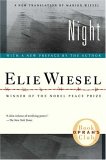Summary | Excerpt | Reading Guide | Reviews | Readalikes | Genres & Themes | Author Bio

Critics' Opinion:
Readers' Opinion:
First Published:
Jan 2006, 144 pages
Paperback:
Jan 2006, 144 pages
Deep down, the witness knew then, as he does now,
that his testimony would not be received. After all, it deals with an
event that sprang from the darkest zone of man. Only those who experienced
Auschwitz know what it was. Others will never know.
But would they at least understand?
Could men and women who consider it normal to assist
the weak, to heal the sick, to protect small children, and to respect
the wisdom of their elders understand what happened there? Would they
be able to comprehend how, within that cursed universe, the masters tortured
the weak and massacred the children, the sick, and the old?
And yet, having lived through this experience,
one could not keep silent no matter how difficult, if not impossible,
it was to speak.
And so I persevered. And trusted the silence that
envelops and transcends words. Knowing all the while that any one of the
fields of ashes in Birkenau carries more weight than all the testimonies
about Birkenau. For, despite all my attempts to articulate the unspeakable,
“it” is still not right.
Is that why my manuscript—written in Yiddish
as “And the World Remained Silent” and translated first into
French, then into English—was rejected by every major publisher,
French and American, despite the tireless efforts of the great Catholic
French writer and Nobel laureate François Mauriac? After months
and months of personal visits, letters, and telephone calls, he finally
succeeded in getting it into print.
Though I made numerous cuts, the original Yiddish
version still was long. Jérôme Lindon, the legendary head
of the small but prestigious Éditions de Minuit, edited and further
cut the French version. I accepted his decision because I worried that
some things might be superfluous. Substance alone mattered. I was more
afraid of having said too much than too little.
Example: in the Yiddish version, the narrative
opens with these cynical musings:
In the beginning there was faith—which is
childish; trust—which is vain; and illusion—which is dangerous.
We believed in God, trusted in man, and lived
with the illusion that every one of us has been entrusted with a sacred
spark from the Shekhinah’s flame; that every one of us carries in
his eyes and in his soul a reflection of God’s image.
That was the source if not the cause
of all our ordeals.
Other passages from the original Yiddish text had
more on the death of my father and on the Liberation. Why not include
those in this new translation? Too personal, too private, perhaps; they
need to remain between the lines. And yet . . .
I remember that night, the most horrendous of
my life:
“. . . Eliezer, my son, come here . . .
I want to tell you something . . . Only to you . . . Come, don’t
leave me alone . . . Eliezer . . .”
I heard his voice, grasped the meaning of his
words and the tragic dimension of the moment, yet I did not move.
It had been his last wish to have me next to
him in his agony, at the moment when his soul was tearing itself from
his lacerated body—yet I did not let him have his wish.
I was afraid.
Afraid of the blows.
That was why I remained deaf to his cries.
Instead of sacrificing my miserable life and
rushing to his side, taking his hand, reassuring him, showing him that
he was not abandoned, that I was near him, that I felt his sorrow, instead
of all that, I remained flat on my back, asking God to make my father
stop calling my name, to make him stop crying. So afraid was I to incur
the wrath of the SS.
Copyright © 2006 by Hill and Wang, a division of Farrar, Straus and Giroux.





The Funeral Cryer by Wenyan Lu
Debut novelist Wenyan Lu brings us this witty yet profound story about one woman's midlife reawakening in contemporary rural China.
Your guide toexceptional books
BookBrowse seeks out and recommends the best in contemporary fiction and nonfiction—books that not only engage and entertain but also deepen our understanding of ourselves and the world around us.